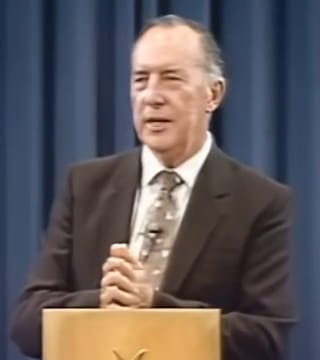Derek Prince - Why Some Christians Don't Like To Read 2 Corinthians (05/14/2024)
This is an excerpt from: The Cross At The Center - Part 1
Paul makes some amazing statements along this line. 2 Corinthians 12. Have you ever noticed that a lot of people today are busy with 1 Corinthians because it's got all the gifts of the Spirit, et cetera; but not many people spend much time in 2 Corinthians. Do you know why? Because its theme is weakness and suffering. And that's not a popular theme.
2 Corinthians 12, beginning at verse 7, Paul is speaking from personal experience. Lest I should be exalted above measure by the abundance of the revelation He's speaking about all the revelations God has given him. And do you know what revelations tend to do? They tend to make us proud. And God loved Paul so much that He guarded against pride in a very unusual way. By releasing an angel of Satan to follow him around from place to place and stir up trouble and persecution and keep him humble. How many of you want to be humble? Well, praise God, I'm glad you do but you may be surprised at the means God will use! This is what he says: Lest I should be exalted above measure by the abundance of the revelation, a thorn in the flesh was given to me.
This is a metaphor taken from the Old Testament where Joshua warned the children of Israel that if they didn't eliminate the Canaanites that had occupied the land but if they let them co-exist, they would be thorns in their flesh. You see, a lot of us have got thorns in our flesh of our own making because we've come into the Promised Land but we've let a lot of Canaanites hang around. One of the things that God is teaching Ruth and me is we have to eliminate the Canaanites. But this was not something that Paul was himself responsible for, this was something God did in his life. He says a messenger but the word is angel. You know, the same word in Greek means angel and messenger. a thorn in the flesh was given me, an angel of Satan to buffet me [to keep beating me] lest I be exalted above measure.
You see, if you study the career of Paul, he was unlike any of the other apostles. They all were persecuted, they all had trouble but Paul's troubles were in a category by themselves. I mean, there was a hardly a city he went to where there wasn't a riot. I mean, the most ridiculous things would provoke a riot. In Philippi, all he did was cast a demon out of a fortune telling slave girl and the whole city was in an uproar. Within a few hours he and Silas were in the maximum security jail. That's not logical. You can't explain that on any process of reasoning. But there was that angel stirring things up against Paul. And basically, wherever he went things got stirred up. With Paul it was usually a riot or a revival-or both! I have to say I think the church needs more riots in order to have some more revivals. Anyhow, we'll not go into that.
Then Paul says everybody knows God answers the prayers of apostles, doesn't He? I mean, surely. But Paul says: Concerning this thing I pleaded with the Lord three times that it might depart from me. And God wouldn't. I tell people sometimes when they say God doesn't answer my prayers, remember no is also an answer. And God said to me, 'My grace is sufficient for you, for my strength is made perfect in weakness.' That's really true. Because when we have our own strength, how can people identify God's strength? They can't see it. But when we've come to the end of our own strength and then we have strength, then we know it's God. God's strength is made perfect in my weakness. Would you like to say that? God's strength is made perfect in my weakness.
From now on you'll be happy to be weak, is that right? I tell you, God heard you saying that. Six months from now you may be sorry you ever listened to me! I talk a lot about confession; you've heard me talk about it. I never ask people to make this confession. It took me years to come to the place where I was willing to make it myself. Listen to what Paul says. Therefore, most gladly I will rather boast in my infirmities [my weaknesses], that the power of Christ may rest upon me. Therefore, [listen to these words] I take pleasure in infirmities, in reproaches, in needs, in persecutions, in distresses, for Christ's sake; for when I am weak, then I am strong. I would not ask anybody here to make that confession because once you've made it you've committed yourself to something.
I have come to the place where on my good days I'm prepared to make that confession. But just think, I take pleasure. Not I tolerate, not I endure, not I suffer with grace but I take pleasure in infirmities, in weaknesses, in distresses, in persecution, in needs. Why? Because he has learned this secret. When we come to the end of our own strength, our own wisdom, our own resources, then God releases His grace. I have a phrase which I use which is 'Grace begins where human ability ends.' You don't qualify for the grace of God as long as you can do it yourself. Why should God release His grace? But when you've come to the place where you can't do it and yet it has to be done, then you qualify for the release of God's grace.

